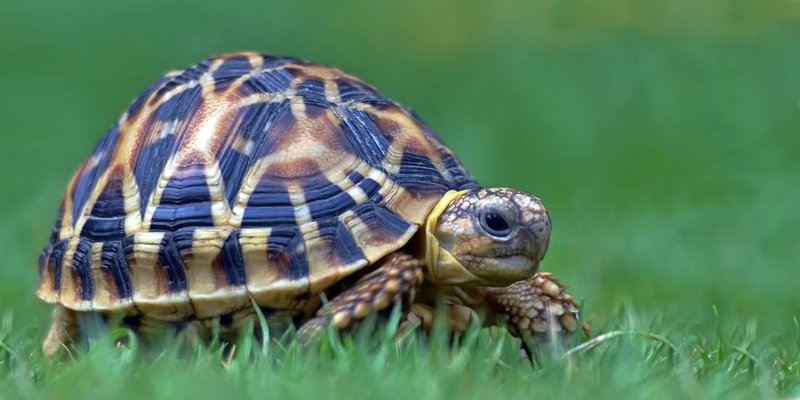
Caring for an Indian Star Tortoise can feel a bit like being a tortoise keeper in a magical land; you’re responsible for their well-being, which can seem daunting at first. But don’t worry! With a solid understanding of their needs and common health issues, you can create a comfortable environment that mimics their natural habitat. Let’s dive into how to keep your Indian Star Tortoise healthy while addressing any concerns that might pop up.
Understanding Their Natural Habitat
Indian Star Tortoises are native to the dry forests and scrublands of India and Sri Lanka. Knowing their natural habitat gives you insights into their needs. Here’s the deal: in the wild, they bask in the sunlight and forage for food. Your job is to recreate this environment as closely as possible.
You might be wondering what that means for their setup. Start with a spacious enclosure, as these tortoises love to roam. Provide areas where they can bask in UVB light, which is crucial for their shell health and overall well-being. Having a warm spot allows them to thermoregulate—important for digestion and metabolism.
Additionally, include a shady area where they can cool off. This mimics their natural environment and helps them feel secure. A mix of soil, sand, and some rocks can recreate a more “earthy” feel that they’re accustomed to.
Proper Diet for Optimal Health
Feeding your Indian Star Tortoise a balanced diet is crucial for keeping them healthy. Let me explain: their diet in the wild consists mainly of grasses, leaves, and some fruits. To replicate this, you should focus on a variety of leafy greens like dandelion, collard greens, and hibiscus leaves.
Avoid feeding them too many fruits, as it can lead to digestive issues. Instead, think of fruits as a treat—like dessert. Calcium is essential for their shell development, so consider dusting their greens with a calcium supplement a couple of times a week. This will help strengthen their bones and shell.
Also, remember to provide fresh water every day. While they don’t drink as much as some animals, they still need access to clean water for hydration.
Common Health Issues
Like any pet, Indian Star Tortoises can face health issues, and being aware of them is half the battle. One common issue is shell rot, often caused by unsanitary living conditions. If you notice soft spots or discoloration on their shell, it’s time to consult a vet.
Another issue is respiratory infections, which can occur if they’re kept in an environment that’s too cold or damp. Signs include wheezing, runny nose, or lethargy. Remember, you want to keep their habitat warm and dry!
Lastly, watch out for signs of topical fungal infections. If you see any unusual spots or growths on your tortoise’s skin or shell, it’s best to act fast. Regularly check your tortoise for any changes to catch potential issues early.
Creating an Enriching Environment
Boredom can be a stealthy enemy to your tortoise’s health. An enriching environment is not just about physical space; it’s about stimulating their natural instincts. Consider adding hiding spots and climbing structures to make their enclosure more interesting.
You can use items like logs, rocks, and plants to create a varied landscape. This setup allows your tortoise to explore and engage in natural behaviors, keeping them active and healthy. A little creativity can go a long way!
Also, rotating their decorations and hiding spots periodically can keep things fresh and exciting. Your tortoise may not run around like a puppy, but trust me, they appreciate a change of scenery.
Regular Health Check-Ups
Keeping tabs on your Indian Star Tortoise’s health is crucial. As a responsible owner, plan for regular visits to a veterinarian who specializes in reptiles. Just like you go for check-ups, your tortoise needs the same care.
During the vet visits, the doctor will check for signs of illness, nutritional deficiencies, and general well-being. It’s a great opportunity to ask any questions you might have! Here’s a pro tip: keep a journal of your tortoise’s eating habits, behaviors, and any health concerns. This can provide valuable information to your vet.
Getting your tortoise examined annually can help prevent bigger problems down the road. Remember, an ounce of prevention is worth a pound of cure!
Signs of Stress and How to Handle It
Stress in Indian Star Tortoises can manifest in a few different ways. If your tortoise is hiding more than usual, refusing to eat, or acting lethargic, these are red flags. Stress can arise from changes in environment, improper temperatures, or even mishandling.
To help your tortoise de-stress, keep their habitat consistent. Stick to a routine for feeding and care. If you’ve recently moved your tortoise or made changes in their space, give them time to adjust.
Creating a calm atmosphere is essential. Avoid loud noises near their enclosure, and handle them gently, allowing them to feel secure in their surroundings. If stress continues to be an issue, it’s worth discussing with a vet who can suggest solutions tailored to your tortoise.
Final Thoughts on Caring for Your Indian Star Tortoise
Caring for an Indian Star Tortoise can be a rewarding experience. With the right knowledge and preparation, you can help them thrive. Remember, keeping them healthy isn’t just about meeting basic needs; it’s about creating a vibrant and engaging environment where they can flourish.
From understanding their habitat needs to monitoring their health, it’s all part of the journey. If you ever feel unsure, don’t hesitate to reach out to a vet or experienced tortoise owner for advice. By taking proactive steps to care for your tortoise, you’re not just ensuring their health but also deepening the bond you share.
Getting an Indian Star Tortoise is just the beginning of a lovely, slow-paced adventure. Here’s to many happy, healthy years with your scaly friend!
